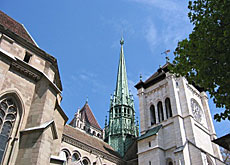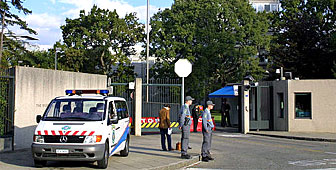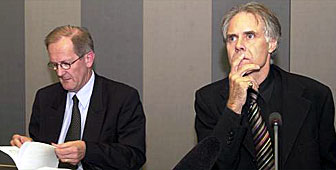Americans in Geneva remember September 11

Geneva's large American community will be marking the anniversary of September 11 in a quiet reflective way.
Many believe that living in a multicultural city has helped them to better deal with the trauma.
The day after the attacks, an ecumenical service was held in Geneva’s St Pierre’s Cathedral. A similar memorial service will be held there on this first anniversary.
“That was where our public mourning began. It makes perfect sense to find ourselves back there a year on,” says Nicholas Porter, rector of Geneva’s Emmanuel Church, known universally as the American Church.
Outpouring of emotion
Porter remembers the “tremendous outpouring of emotion and sympathy” that followed the attacks. A year on, any events marking the anniversary will be very low-key. Quiet remembrance will be the order of the day.
“A big event runs the risk of being politicised. A media feeding-frenzy would be inappropriate,” says Summer Huyette, president of the American International Women’s Club of Geneva.
When the attacks happened, the reaction of the American community in Switzerland was one of shock and disbelief, tinged with a certain amount of fear.
“We did feel vulnerable. You don’t know who’s going to be targeted,” Huyette says.
On an individual level, there was a certain amount of relief: “A number of members had husbands who were supposed to be in the World Trade Center that day,” she says. Miraculously none perished.
Robert Spencer, president of the American International Club, speaks of a “heightened anxiety” in the community, something that inevitably brought Americans in Geneva closer together.
Support network
An emotional support network was needed in the days and weeks after the attacks and institutions like the American Women’s Club, the American International Club and the American Church provided it.
“We noticed a huge increase in participation. We were meeting a need. People of all nationalities needed to get out of the house, be with other people,” Huyette says. “Making new friends helps you deal with your emotions.”
The American clubs in Geneva are not exclusively American. Their membership reflects the international nature of the city. September 11 helped to cement the bonds between people of all nationalities.
“Americans find strength and sustenance in the international community. Our friends from Switzerland and other countries have been very supportive,” Spencer told swissinfo.
This solidarity perhaps came from the fact that everyone felt a potential target.
The victims of the terrorist attack came from many countries. Indeed, Spencer, who is also director of Webster University in Geneva, says only one pupil lost relatives in the attacks – and she was Swedish.
Reassessing the tragedy
Porter believes that the international nature of Geneva helped expatriate Americans here to come to terms with the tragedy better than their compatriots at home.
“Our sense of insult and outrage has lessened more quickly,” he told swissinfo.
“We got over those initial emotions because we have a broader point of view. All of us have friends who are Muslim or from the Middle East. Those fears don’t lurk in our imaginations,” he added.
The cleric says the time that has elapsed since the attacks has allowed a more positive reassessment of the tragedy.
He says Americans can now empathise with other victims of violence around the world – people they might previously have ignored. September 11 has also provided a “positive lens through which to take a harder look at our society”.
Positive thinking
Summer Huyette also tries to put a positive spin on the attacks: “Terrible things happen around the world all the time. We can’t dwell on it. We have to combine our energies and move on.”
“Where there’s life there’s hope,” she says.
One year on, emotions are less raw. But the attacks on New York and Washington continue to cast a long shadow over people’s lives.
“It’s still very present in our minds. I don’t think there’s an American anywhere that doesn’t feel affected by it,” Spencer says. “It’s had a sobering effect. People are less irrational now.”
“I’ve spent a lot of time thinking about what happened,” Huyette says. “The more you analyse something, the less emotional you are. But the wariness and vulnerability remain.”
swissinfo, Roy Probert

In compliance with the JTI standards
More: SWI swissinfo.ch certified by the Journalism Trust Initiative



You can find an overview of ongoing debates with our journalists here . Please join us!
If you want to start a conversation about a topic raised in this article or want to report factual errors, email us at english@swissinfo.ch.